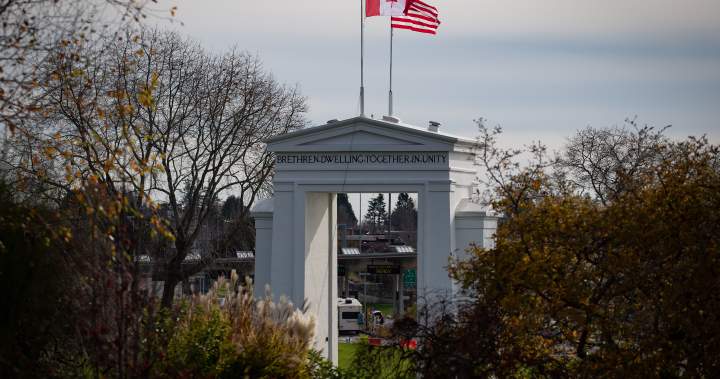Canada will launch a public consultation ahead of the upcoming review of the Canada-U.S.-Mexico trade agreement (CUSMA) Canada-U.S. Trade Minister Dominic LeBlanc’s office told Global News.
“In preparation for the upcoming Canada-United States-Mexico Agreement (CUSMA) review, Canada will be engaging with Canadian industry leaders, provinces and territories and Indigenous partners,” a spokesperson for LeBlanc’s office said.
“To that end, our government will be launching public consultations in the near future. This exercise, which will build on consultations undertaken in 2024, will enable us to gather valuable feedback from Canadians.”
The U.S. Trade Representative is set to begin 45 days of public consultations ahead of the review that is set to take place next year.
A preliminary U.S. Federal Register notice posted online Tuesday said there also will be a public hearing in that country in November.
It marks a new step toward renegotiating the sweeping trade deal that was signed during the first Trump administration.
Trump praised the deal, which replaced the longstanding NAFTA free trade deal, but also has described it as “transitional” and has questioned whether it’s still necessary.
Prime Minister Mark Carney has been working on a trade and security deal with the U.S. that aims to get the multiple rounds of tariffs imposed on Canada by U.S. President Donald Trump removed.

Get breaking National news
For news impacting Canada and around the world, sign up for breaking news alerts delivered directly to you when they happen.
Finance Minister Francois-Philippe Champagne said to reporters on Wednesday that Canada is still seeking a comprehensive agreement with the U.S, but that it is clear the country needs to “look at new markets.
“Canada has always been at the center of this industrial landscape that you have in North America. But obviously when someone turns its back, you have to find ways to strengthen the Canadian economy and look at new markets,” Champagne said.
He added, “It is sad, I would say, that our largest trading partner turned its back on Canada, which has led to us having to reassess how we’re going to build the economy of the future.”
Champagne said Ottawa has been “engaging very actively with the U.S. administration since the beginning.”
Some Canadian industry groups say they welcome a review the agreement.
“From our perspective, it is good to see that the U.S. has advanced the review of the USMCA,” said David Adams, president and CEO of Global Automakers of Canada.
USMCA is another acronym for the CUSMA trade deal.
However, he added this could push further down the line any resolution of the sectoral tariffs imposed by the U.S. which have had a heavy impact on the auto sector.
“This could mean that the (Section) 232 tariffs on autos do not get resolved and get wrapped up into the USMCA review process,” he said.
Dan Kelly, president of the Canadian Federation of Independent Business, says an early review of the deal might help cut through the uncertainty of the trade war.
“Right now, many Canadian business owners that import from or export to the United States are feeling frozen – unsure which direction things may head. This uncertainty is having real consequences, preventing them from hiring or investing until more is known about our trading relationship for the future,” he said.
Canadian Manufacturers and Exporters (CME) said they would support a renewed CUSMA that preserves free trade, removes the “damaging tariffs” and “avoids concessions that would weaken Canada’s industrial economy.”
“Canadian manufacturers welcome this process and as with previous negotiated agreements, CME along with our Mexican and U.S. counterparts will be working closely with governments for a deal that is beneficial to all,” CME said in a statement.
While Canada and Mexico were early targets of Trump’s tariffs, those duties do not apply to goods compliant under the trade pact.
Canada and Mexico are being hammered by Trump’s separate tariffs on steel, aluminum, copper and automobiles. Canadian officials have said their priority is to find an off-ramp for these sectors through a bilateral economic and security agreement ahead of the CUSMA review.
The consultations and review are required under American law but businesses have been waiting for the process to officially begin.
–with files from The Canadian Press
Read the full article here

